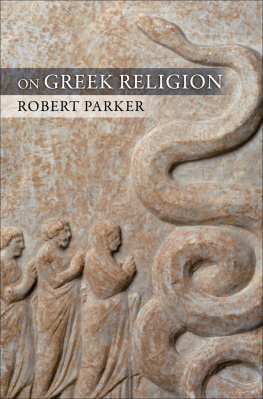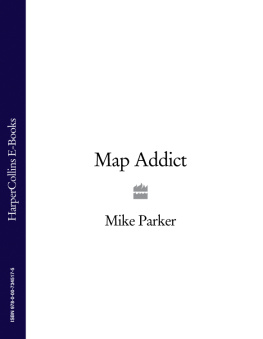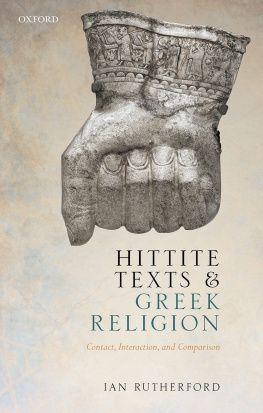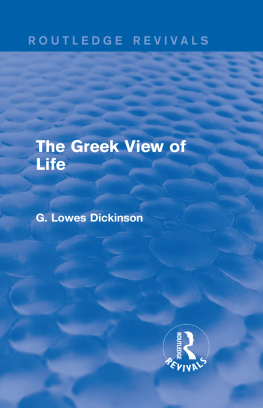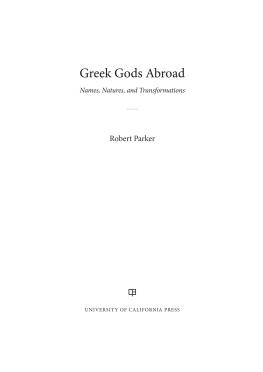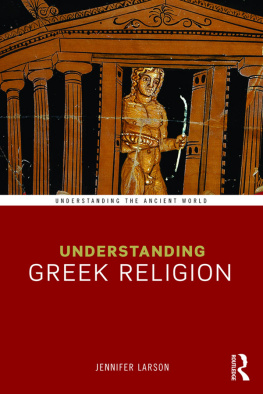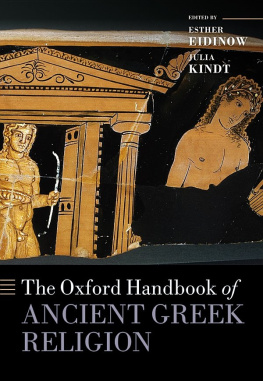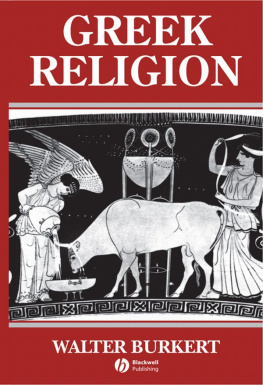Parker - On Greek Religion
Here you can read online Parker - On Greek Religion full text of the book (entire story) in english for free. Download pdf and epub, get meaning, cover and reviews about this ebook. publisher: Cornell University Press, genre: Religion. Description of the work, (preface) as well as reviews are available. Best literature library LitArk.com created for fans of good reading and offers a wide selection of genres:
Romance novel
Science fiction
Adventure
Detective
Science
History
Home and family
Prose
Art
Politics
Computer
Non-fiction
Religion
Business
Children
Humor
Choose a favorite category and find really read worthwhile books. Enjoy immersion in the world of imagination, feel the emotions of the characters or learn something new for yourself, make an fascinating discovery.
On Greek Religion: summary, description and annotation
We offer to read an annotation, description, summary or preface (depends on what the author of the book "On Greek Religion" wrote himself). If you haven't found the necessary information about the book — write in the comments, we will try to find it.
On Greek Religion — read online for free the complete book (whole text) full work
Below is the text of the book, divided by pages. System saving the place of the last page read, allows you to conveniently read the book "On Greek Religion" online for free, without having to search again every time where you left off. Put a bookmark, and you can go to the page where you finished reading at any time.
Font size:
Interval:
Bookmark:
 Acknowledgments
AcknowledgmentsThis book derives from the Townsend lectures that I had the honor of giving at Cornell University during the autumn of 2008. Given my topic, I was pleased to learn, on my first day on campus, that Ezra Cornell had founded the university as a nondenominational, anti-sectarian institution, which in the stirring words of Andrew D. White would be an asylum for science where truth shall be sought for truths sake. where it shall not be the main purpose of the Faculty to stretch or cut Science to fit Revealed Religion. The hospitality and helpfulness of many colleagues made my stay in Cornell a happy one, and I hope it is not invidious if I single out for thanks Kevin Clinton and Nora Dimitrova, Gail Fine and Terry Irwin, Hayden Pelliccia, Hunter Rawlings III, Jeff Rusten, and most especially Charles and Harriet Brittain. I remember with affection too the nine participants in my graduate seminar. Among those who have worked on this book for Cornell University Press I am especially grateful to Peter Potter for comments on my manuscript, to Marie Flaherty-Jones for admirably attentive copyediting, and to Candace Akins for always helpful manuscript editing. I must also thank the University of Oxford for the years leave that allowed me to visit Cornell and then prepare the lectures for publication.
I was able to discuss my first ideas for this book with Christiane Sourvinou-Inwood. Our dialogue about Greek religion extended back so far that I can no longer remember precisely when it began. The book would be a better one had that dialogue not been prematurely cut short by her death in May 2007. I dedicate it to her memory.
. Letter of August 1862 to Gerrit Smith, quoted in M. Bishop, A History of Cornell (Ithaca, 1962), 4142.
. A brief account of her work is forthcoming in the Oxford Dictionary of National Biography.
 Appendix 1
Appendix 1Socrates in Platos Republic To construct a parallel list of decisions that were made without consultation of an oracle is scarcely practicable, but cases will be mentioned in what follows. Much relevant material has surely escaped me; I present this appendix in order to pose the question.
Table 2. Public Oracular Consultations on Questions of Cult
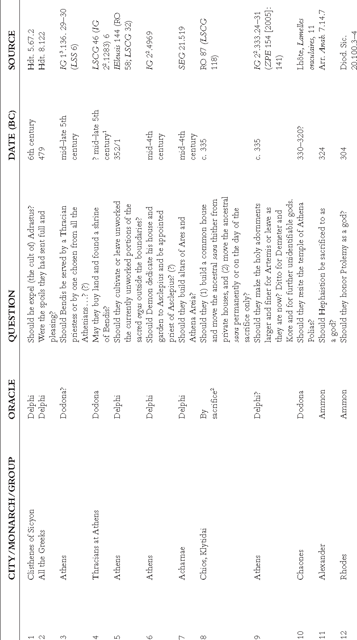

Two inquiries relate to the terms of tenure of a priesthood: inquiry 3 in Against these two inquiries can be set the very numerous texts that in one way or another regulate priesthoods but make no mention of a consultation. Priestly perquisites, duties, and privileges must have been a matter for human decision, not divine; the quantity of evidence for unreferred decisions on such topics is overwhelming.
It is less clear how often the more fundamental questions about the kind of occupant required were so settled; many priesthoods are advertised for
There are two inquires about relocating a temple (10, 14), and a pair (together in 8) about relocating sacred objects in a new house to be built to receive them. The only relocation conducted without such sanction that I can confidently point to is that of the image of Artemis Leukophryene to her Parthenon in Magnesia on the Maeander; and here the magnificence of the new temple, and of the ceremony by which the goddess was brought to it, perhaps provided the necessary justification. There must also be doubt whether Seleukos II (?) sought oracular authorization before ordering the relocation of a precinct of Soteira on the island of Failaka; but kings had an unusually free hand.
One question each is asked about two familiar practices, the loaning of sacred money (17) and the agricultural exploitation of sacred land (5). The latter concerns the most special case that can be imagined, the ever-controversial sacred orgas on the borders of Attica and Megara; it would have been extraordinary if the Athenians had considered bringing part of that land into use without special authorization. But they make an analogous decision about the precinct of Codrus on their own responsibility. but we do not find the gods involved through oracles in this area of activity.
Greek cities often asked general questions about their future well-being, and the response would often take the form of advice to sacrifice to a particular god or gods; this will be the origin, or one of the origins, of the epithet pythochr stos, by order of Pythian Apollo, borne by some gods. But it is unclear how often proposals to institute new sacrifices or build a new altar were taken to Delphi for approval. A verdict on this point depends in part on the ambiguous allusions mentioned above to action undertaken in accord with an oracle. Inquiry 7 appears to be one example, It is not just, then, that day-to-day decisions about expenditure on particular cults were of necessity taken locally; thoroughgoing revisions of a sacred calendar could also be entrusted to human intelligence.
The introduction of new gods was, we know from the trial of Socrates, a sensitive area. But less oracular involvement is attested than might have been expected. It was in accord with the response from Dodona that the Athenians granted to the Thracians alone of all foreign peoples the right to acquire land and found a shrine (of Bendis), those Thracians announce (inquiry 4: the same response as that concerning the priestess of Bendis, 3? The point is not clear.). But an identical decision in favor of the Citian worshippers of Aphrodite was taken by the Athenian assembly in 333/2 on its own authority. Number 18 is an inquiry from Istria about Sarapis; but the question may have been how to honor him, not whether. The Egyptian cults spread widely without leaving any other traces of oracular consultation about them; the coming of Sarapis to Delos aroused controversy, but it was settled by litigation and (on the pious view) a miracle, not by reference to an oracle. Against the two questions posed to oracles about ruler cult (12, 13) can be set the many decisions to honor rulers taken directly by the cities.
It is difficult to identify a topic, except perhaps the relocation of a sanctuary, on which consultation is mandatory; topics on which it never occurs, on the other hand, such as sanctuary discipline or priestly emoluments, can readily be found. The conclusion seems to follow that, on the issues where consultation may or may not occur, it is not routine; the case is problematic or controversial in some way that debars a human decision on the basis of tradition and precedent. It is easy to see what is exceptional about certain cases not yet mentioned: abolishing an existing cult (1) would have been a very drastic action, as was permitting an intermural burial (16); the repulse of the
. 427 BC.
. For instances, see Fontenrose, Delphic Oracle, responses H 2 (the Praxiergidai (?) should put on the peplos and make sacrifices); 30 (the Athenians should spread a couch for Pluto and adorn a table); LSCG 178 (fees for drinking from the spring of Halykos); [Plut.] X Orat. 843F844A (gilding of altar of Apollo). For still vaguer cases, see IEleusis 28a ( IG 1.78; LSCG 5; ML 73: Eleusinian first-fruits decree); LSS 14.11, 16, 24 (Apollo should be honored as Patroos); IEleusis 138 A 10 ( Agora 16:56; LSS 12: Eleusinian sacred truce?); RO 97 ( LSS 115, purifications at Cyrene); LSA 42 (cult of Heracles), ibid. 67 B 11. The same difficulty applies to cults that are designated as pythochr stos: J. Robert and L. Robert in the best treatment ( Fouilles dAmyzone en Carie [Paris, 1983], 1:11013), suppose that a specific inquiry has often been made, but their 112 n. 122 illustrates the other possibility.
Font size:
Interval:
Bookmark:
Similar books «On Greek Religion»
Look at similar books to On Greek Religion. We have selected literature similar in name and meaning in the hope of providing readers with more options to find new, interesting, not yet read works.
Discussion, reviews of the book On Greek Religion and just readers' own opinions. Leave your comments, write what you think about the work, its meaning or the main characters. Specify what exactly you liked and what you didn't like, and why you think so.

